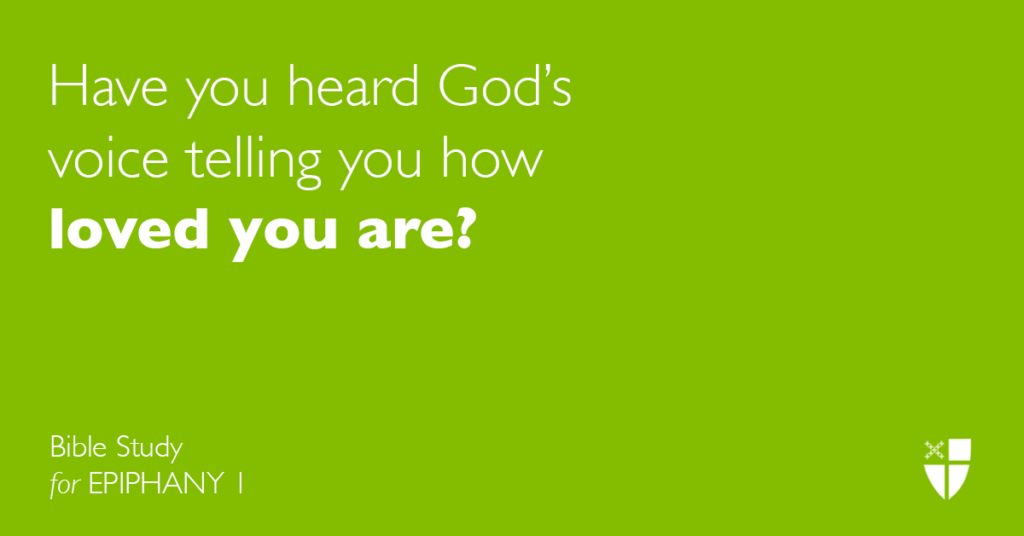Bible Study: Epiphany 1 (B) – 2021
January 10, 2021
RCL: Genesis 1:1-5; Psalm 29; Acts 19:1-7; Mark 1:4-11

Genesis 1:1-5
This is the beginning of the priestly (or “P”) creation story, written by the priestly class of Israelites during the exile in Babylon. The priests wrote of a God so powerful that he could bring the world into existence simply by speaking. Such a God would be able to deliver the people from their painful separation from Jerusalem, to lead them back home to rebuild their ruined Temple. The powerful Word of God says, “Let there be light,” and the text pronounces that the command was fulfilled. God even looks at the work and approves: God “saw that the light was good.” God speaks light into existence, and then “sees” that God’s own creation is good.
God notices and comments on God’s own work in the world, something that we can practice in our daily lives. Further, the power of the Word of God, right in this beginning text of the Hebrew Bible, reminds us of the power of scripture itself.
- Where have you noticed God’s creation in the world lately? What has made you say, “it is good”?
- Where in this text do you find God speaking to you? What does it mean to you that the Bible is the Word of God?
Psalm 29
The might and strength of God continue into the psalm. The psalmist echoes language in Genesis 1; while Genesis says, “a wind from God swept over the face of the waters,” the psalmist writes, “The voice of the LORD is upon the waters.” This voice is a “powerful voice” that forcefully “breaks the cedar trees.” God is expressing God’s power – and, perhaps, strong emotions. Is God expressing anger with a voice that “splits the flames of fire,” “shakes the wilderness” and “makes the oak trees writhe”? It certainly feels like an image of anger, and it’s an image of anger that is not small but huge, powerful, breathtaking – beautiful, even. God’s strong emotion and voice are enough to rattle the world, to bring change, to bring justice. It’s a reminder that we can have strong emotions, too, and sometimes those emotions can be a force for change.
- Can you express your strong emotions or your anger to God in prayer?
- Are there places in your community or the world where you wish God would act today with strength and power?
Acts 19:1-7
Paul comes upon some disciples in Ephesus, then part of the Roman empire, now part of modern-day Turkey. Finding that they were given John the Baptist’s baptism of repentance, but not baptized in the name of Jesus, he baptizes them as Christ-followers and they receive the Holy Spirit. The Book of Common Prayer allows any baptized person to administer Baptism in an emergency situation, but always with the required words, “I baptize you in the name of the Father, and of the Son, and of the Holy Spirit” (Book of Common Prayer, p. 313). Baptism, once performed, is “indissoluble” (BCP, p. 298). But this passage reminds us that although we are only baptized once, our call as Christians is ongoing. We may think we are going along, doing what God wants us to do, and then we meet a Paul, we encounter the Spirit, and we are asked to go deeper.
- Do you remember your baptism? If you were baptized as a baby, do you remember your confirmation, where you affirmed those vows? Look over the Baptismal Covenant (BCP, p. 304-5) and reflect on what it means to live those vows.
- Where might God be calling you to go deeper into your relationship with God?
Mark 1:4-11
Well, in case you haven’t noticed by this time, today’s lectionary readings all have some kind of epiphany, a moment of revelation, an insight into God’s presence and work in the world. In Genesis, God pronounces some words and creates light. In Psalm 29, God cracks open the cedar trees. In Acts, the Holy Spirit comes upon the newly baptized, and they speak in tongues.
Here in Mark’s Gospel, we get a voice from heaven, declaring that Jesus is a beloved child of God. We also have the sign of John himself, clothed in a way that ancient readers would have recognized as looking like the prophet Elijah, and saying that someone else – someone great – is coming. This just increases the anticipation and suspense at that moment when Jesus emerges from the river Jordan, dripping wet, and the sky breaks open and the Spirit comes down like a dove. An epiphany, for sure.
The thing is, this epiphany about Jesus is an epiphany for all of us, too. This revelation, this epiphany about Jesus is also an epiphany about us. As Church Father Athanasius of Alexandria said in the fourth century, “He became human that we might become god.” Jesus’ incarnation reminds us that we are all the Beloved, we are all children of God, with whom God is well pleased. Remembering this belovedness can strengthen us during difficult times and help us live into our call as followers of Christ.
- Have you heard God’s voice telling you how loved you are? Try sitting in silence for a few minutes and listening for that voice.
- When have you experienced an epiphany, a sudden insight into something deeply real, deeply true? Where did that insight lead you?
Don’t forget to subscribe to the Sermons That Work podcast to hear this sermon and more on your favorite podcasting app! Recordings are released the Thursday before each liturgical date.
Receive Free Weekly Sermons That Work Resources!


